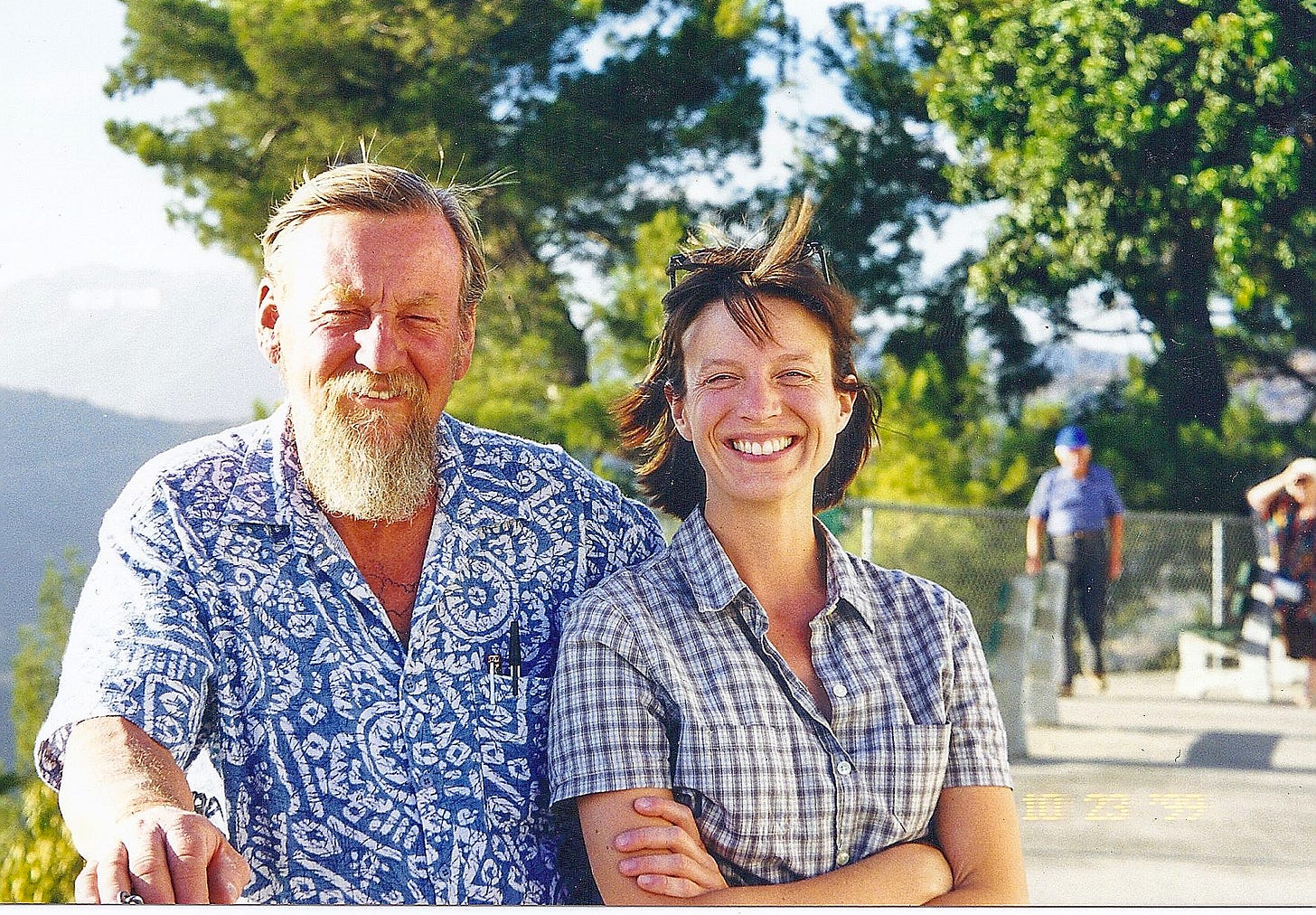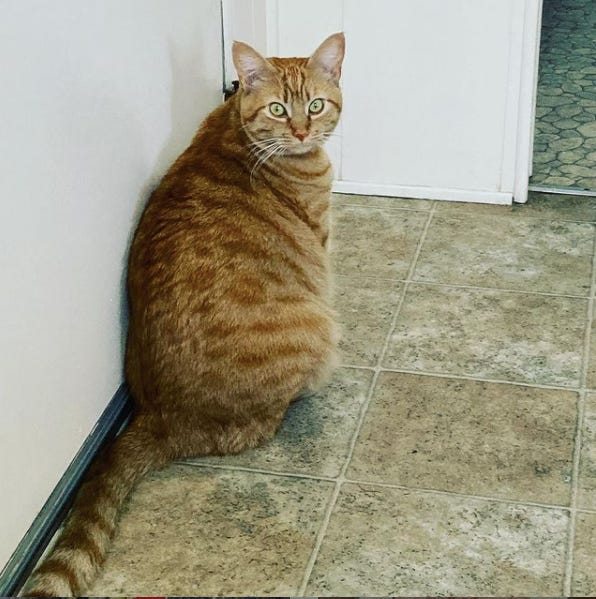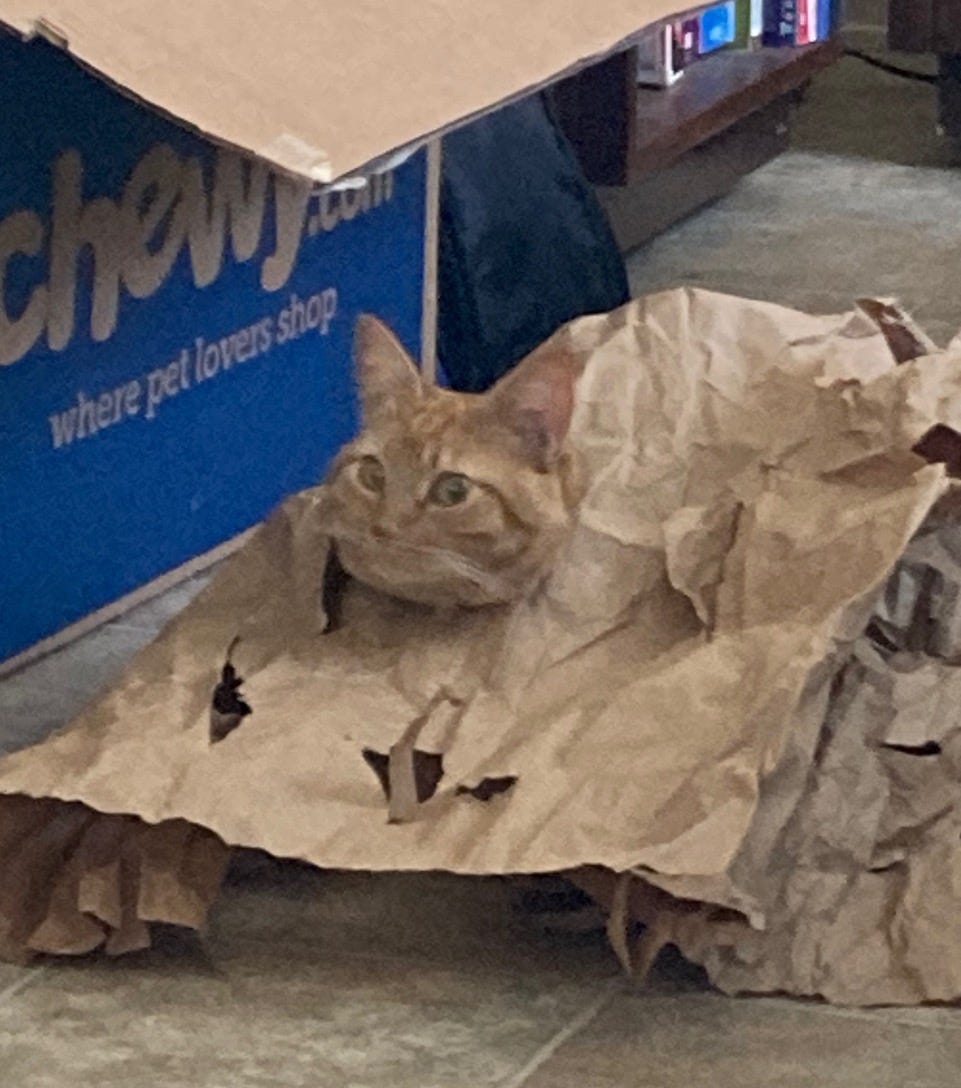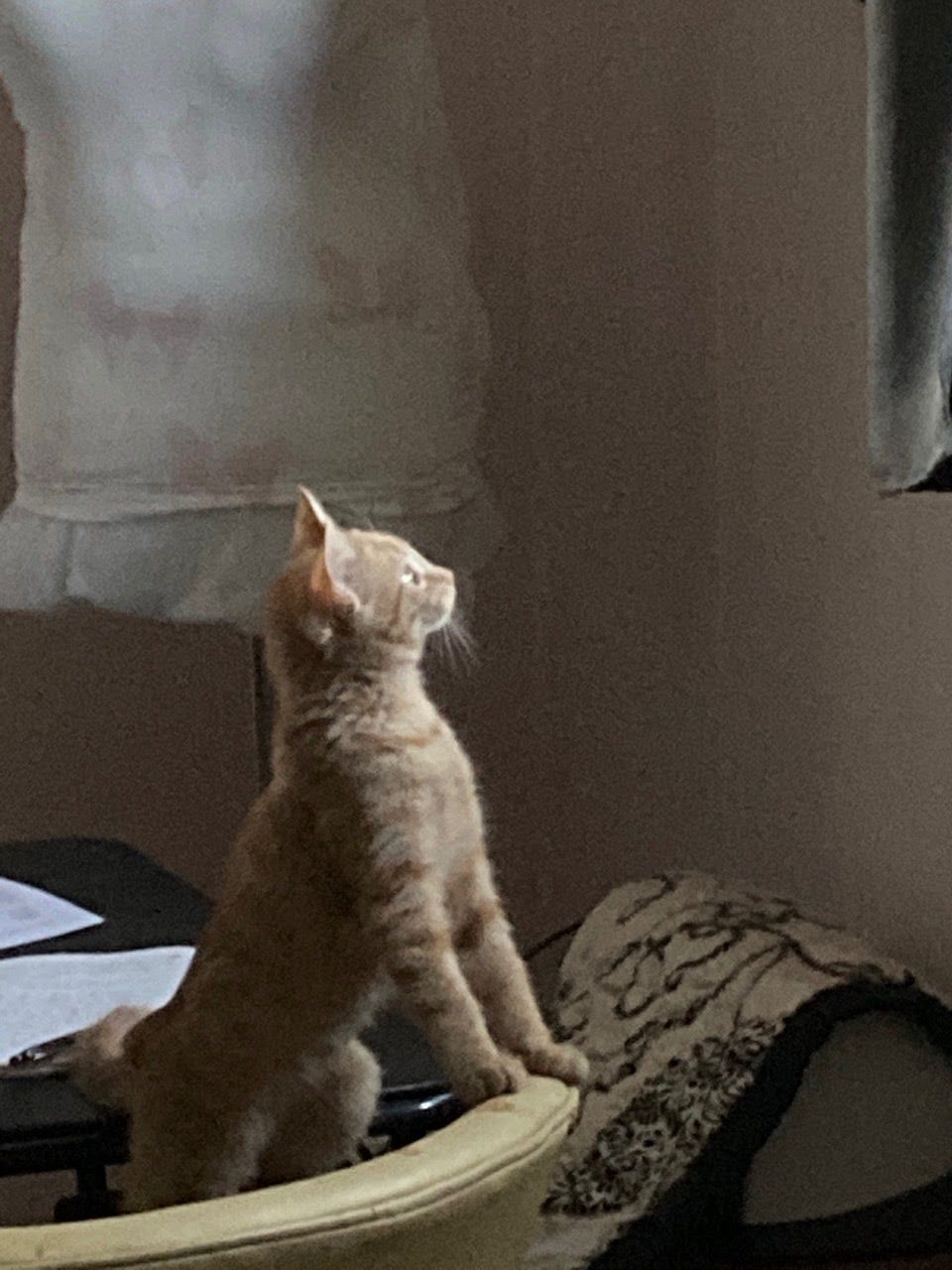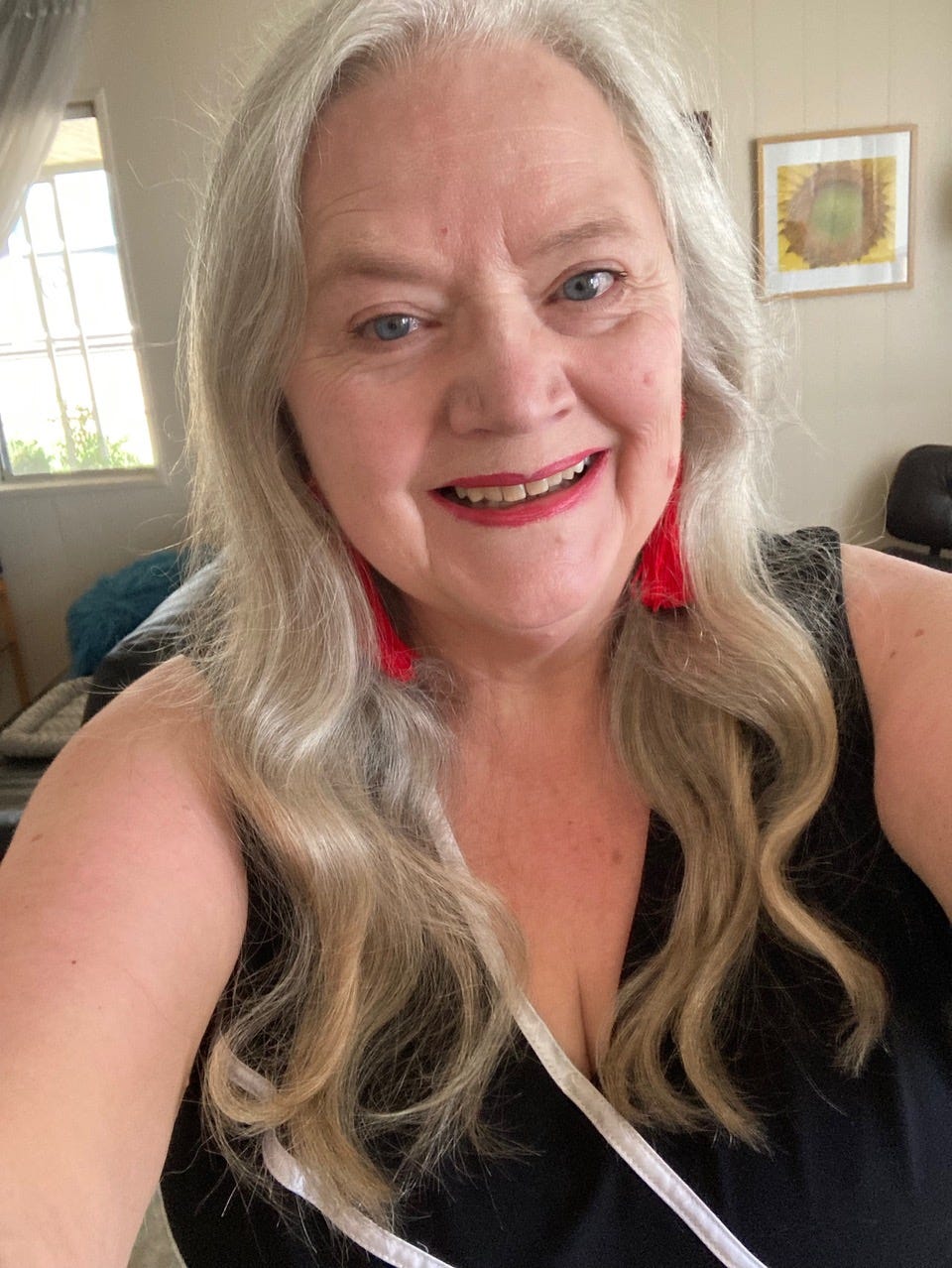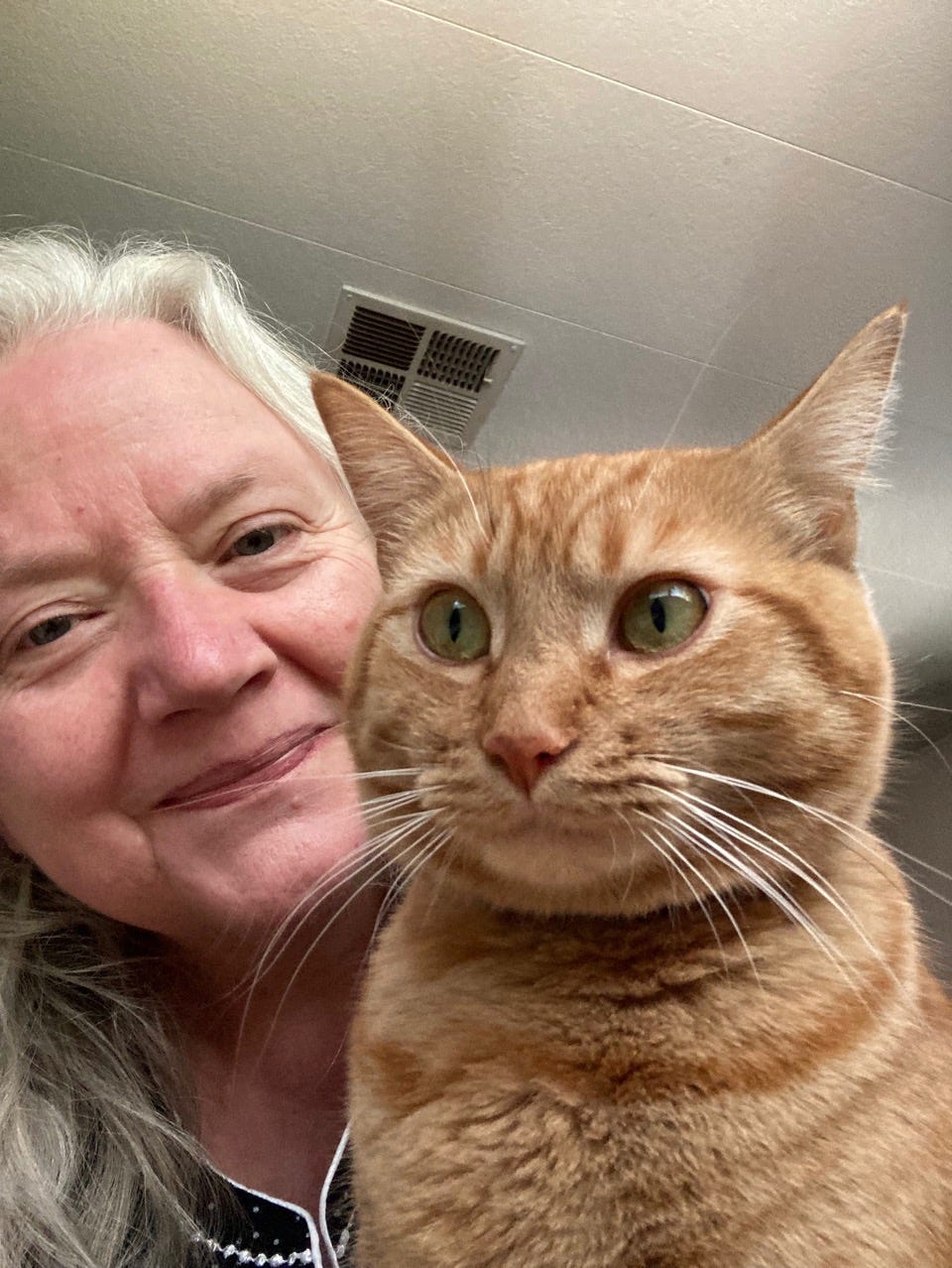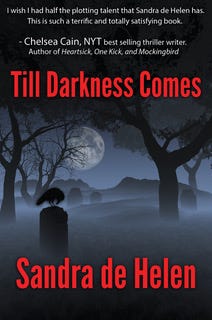Welcome! You’ve reached Spark. If a book club married a writer’s group, this community would be their child. Learn more here or just read on. If you received this from a friend, please join us by subscribing. It’s free! All you have to do is press the button below. Thanks for joining us!
In this issue:
A lesson from Tinkertown: Guest Post from Tanya Ward Goodman
Writer’s Dog #7: Louie, the feline assistant to writer Sandra deHelen
Mary Oliver, once again, has the right words for this moment
The second goodbye
By the time you read these words, I will be three thousand miles away from my usual spot, awash in the emotions that come with returning to New Hampshire after two years away. The last time I was there was the fall of 2019 when I, with my sister and my dad’s wife, helped my dad from his home to the memory care unit of a wonderful assisted living facility only a few miles from his house. A week from today, we finally gather to bury him.
The last time I hugged my father was when I said goodbye in the garden of the facility. Getting him there involved many difficult moments -- an understatement. His wife, however, had been doing the hardest part for five years. She’d cared for him, protected his dignity, and kept him home for as long as she could. She had said little about what this involved until the day she realized it was time. My brother, too, had been on the front lines for a long time. He and my dad were in business together, not easy when Dad was struggling with dementia and trying hard to hold onto what they had built. The weeks I spent with my dad in August and September of 2019 made it very clear why they were exhausted emotionally and physically, but also why they had worked so hard to help him. So much of what made him who he was was still in there, glimmering and, often, surfacing as if nothing had changed.
I’m still processing much of what I experienced as my dad slipped so I am not going to write about that now. Instead, in honor of my father and all those who have dealt with dementia, I asked Tanya Ward-Goodman to share a brief essay. She cared for her father who was diagnosed with early-onset Alzheimer’s in his fifties and wrote a mesmerizing, funny, and intriguing memoir about it called Leaving Tinkertown. Her essay offers a glimpse of the lessons her father taught her even as he declined, lessons that have helped her now as she watches her children leave the nest.
I’m guessing that many of us have been touched by the effects and the fear of Alzheimer’s or another kind of dementia. I’d love to hear from you in the comments section or email about your own experience, thoughts, fears when it comes to Alzheimer’s or caring for someone with the disease. You never know how what you share can be just what someone out there needs to hear. If you know of a book or article that is helpful or just a beautiful read that can feed the soul, please share that too.
A little bit about Tanya
Tanya Ward Goodman is the author of the award winning memoir, Leaving Tinkertown. Her essays and articles have appeared in numerous publications including the Washington Post, the Los Angeles Times, Luxe, Coast Magazine, OC Family, Orange County Register, The Huffington Post, and Literary Mama. Her essay, "What Life Does," originally published in Fourth River was listed as notable in the 2019 Best American Science and Nature Writing.
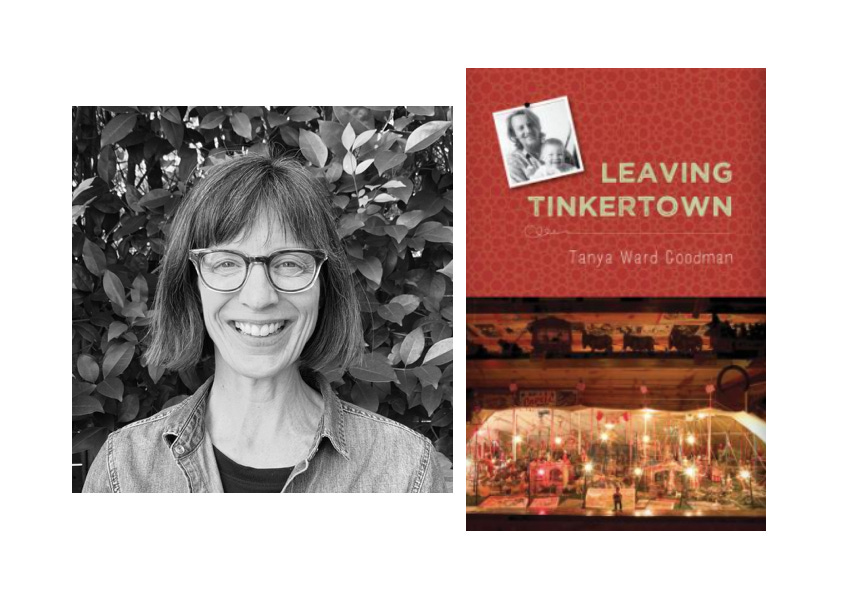
Leaving Tinkertown
About Leaving Tinkertown: Ross Ward was an eccentric artist and collector whose unique museum, Tinkertown, brought visitors from all over the world to the Sandia Mountains outside Albuquerque. In this book Tanya tells Ross's story and her own, sharing the tragedy and the unexpected comedy of caring for this funny, stubborn man who remained a talented artist even as his early-onset dementia changed him before his family's eyes.
You can keep up with Tanya by subscribing to her newsletter, Mighty Fond of You, or on her website. She can also be found on Instagram, and Twitter.
Be A Little Less There
Tanya Ward Goodman
“Be a little less there,” my eleven-year old daughter once told me. “You know when people disappear in the movies?” she asked, “when they get a little see-through and kind of fade from the top? You should do that.”
Five years later, she's sixteen and I am still trying to take these words to heart.
Before I had children, I was one of the primary caregivers for my father after he was diagnosed with early onset Alzheimer’s at age fifty-seven. I left Los Angeles for the mountains of New Mexico to spend as much time with my dad as possible. I just wanted to be with him. But, like my daughter, he needed me to be a little less there.
“Don’t you live in Los Angeles?” he asked again and again.
“I do,” I said. “But I’m here now. With you.”
It was my job to keep him safe, but I had to learn to do it without being obvious.
Caregiving is a constant balance of trade-offs and negotiations. At the beginning, my stepmother and I kept Dad on our schedule. We sat down to meals at the regular time and encouraged him to change clothes and take baths. We were devastated by the diagnosis and in our sorrow we sought the comfort of structure and rules. This worked for a while, but Dad was becoming less tethered to our world. In order to be with him, we needed to be flexible. This meant letting him eat when he was hungry, it meant trading in regular showers for a long soak in the hot tub, it meant letting go of time and space and even sometimes our own identities. In order to be with him, we had to be what he needed at that moment.
I remember a day when Dad ate nine ice cream sandwiches on the way home from the market. He was so delighted that I didn’t have the heart to ask him to stop. An excess of ice cream wasn’t going to kill him. He was going to die from complications of Alzheimer’s disease. Instead of saying “don’t,” I looked for opportunities to say “do.”
Together Dad and I visited rock shops and bookstores and ate bags of candied orange slices. We bought colored pencils and sang along with Willie Nelson and Hank Williams. When he stopped to admire the shiny back of a beetle or the shape of a cloud, I stopped, too. I let Dad lead the way, knowing there would be many days in the future when I would be on my own.
I don’t mean to paint only a pretty picture, here. It is not easy to be a caregiver. Just as it is not easy to be a parent. I like to think about the clouds and the candy and the singing of songs, but I know it’s not always like that. There were days when my father’s anger was frightening. There were days when he drank too much beer and days when he wet his pants. Once he set fire to the back yard. My father’s geography changed daily and, as a family, we re-mapped as often. The idea of being “less there,” helped us let go of our own expectations, self-doubt and regret and enabled us to live in two worlds.
It’s hard to let go. As my children begin to navigate away from me my fingers ache with the desire to pull them back, but I learned from their grandfather that the best way to show love is by offering freedom. I marveled that my young daughter could so quickly find such an apt metaphor for caregiving, but she continues to remind me that this is her story, too.
Interlude
“In Blackwater Woods” by Mary Oliver from her collection American Primitive
Look, the trees
are turning
their own bodies
into pillars
of light,
are giving off the rich
fragrance of cinnamon
and fulfillment,
the long tapers
of cattails
are bursting and floating away over
the blue shoulders
of the ponds,
and every pond,
no matter what its
name is, is
nameless now.
Every year
everything
I have ever learned
in my lifetime
leads back to this: the fires
and the black river of loss
whose other side
is salvation,
whose meaning
none of us will ever know.
To live in this world
you must be able
to do three things:
to love what is mortal;
to hold it
against your bones knowing
your own life depends on it;
and, when the time comes to let it go,
to let it go.
The Writers Cat: Meet Louie, Feline Assistant to Sandra deHelen
AKA: Lucretia Mott, Lulu, Louberta
Known for… Recycling. I love discarded bits of paper, cardboard boxes, large pieces of brown paper that Chewy sends me for free. I do my bit by carefully tearing the paper into tiny bits, and shredding the boxes.
Expert at... Chasing the red dot from Sandra’s flashlight. I know the sound of the click and instantly go on alert when I hear it (or anything that sounds like it – what is that about? Nothing should sound like my red dot). I can run from one end of the house to the other, leap up walls, whatever it takes to catch the red dot.
What I live for… Besides the red dot? Well, face pets are a close second. My face is soft and I love to rub it into my writer’s hand, or her daughter’s hand.
How I met my writer… She adopted me from the Humane Society on January 2nd after my first adopter returned me for being “too shy.” Sandra instantly recognized that my “shyness” was actually fear. I was terrified of people, noises, sudden movements, even paper bags which seems silly now. After only eleven days, I allowed her to pet my face. She gets me.
How it’s been going so far…. I’ll admit I am still scared of some things. I don’t like it when other people come into our house. I have to trust my writer will protect me. Trust but verify, that’s my motto.
Something you should know about my writer… She’s infinitely patient with me. No matter what I do, she either thinks it’s cute or she forgives me. She never yells at me or hurts me. Also, she gives me the best food and treats. I think I’ll keep her.
Meet (Louie’s) Writer: Sandra deHelen
Known for… A lot! She writes plays, poems, novels, and essays. Sandra de Helen currently lives and writes in San Diego County, but will soon return to Portland, Oregon. She is author of the Shirley Combs/Dr. Mary Watson mystery series, set in Portland; Till Darkness Comes, a thriller set in Kansas City, Missouri; and four collections of poetry published by Launch Point Press. Sandra is a member of the Golden Crown Literary Society, Dramatists Guild, Honor Roll! and International Centre for Women Playwrights. You can find links to all of her work on her website.
How I help Sandra … I rescued her from depression following the death of her sixteen year old Manx/Maine Coon Asia. I keep her busy, cuddle with her through the night, and amuse her with my antics. I tell her when it’s time to get up and start writing, I remind her to take time to play, I show her that one can be creative with nothing more than a shadow to spark inspiration.
What Sandra does when she is not with me … Unlike me, she leaves the house—usually every day. If she brings anything back, I check it out. Otherwise, I’m just happy to know she didn’t leave forever. Mostly she plays with her laptop. If there’s anything happening on the screen besides black marks on white pages, I might look at it. Occasionally there are birds or animals and that’s interesting. I don’t know why she gets so much screen time. I’m only allowed ten or fifteen minutes. It doesn’t seem fair, but as she’s the one who feeds me, I don’t complain until bedtime. She also cleans my cat box. I always use it immediately after so she knows I appreciate her efforts.
Here’s what others are saying... "I wish I had half the plotting talent that Sandra de Helen has. This is such a terrific and totally satisfying book." - Chelsea Cain, NYT best-selling author of Heartsick, One Kick, and Mockingbird. Cool, right?
Where to find us…YouTube, Facebook, Twitter, Instagram
Also: www.SandradeHelen.com, www.launchpointpress.com/books.html
That’s it for this week. Spark will go “dark” next week on Saturday, September 25th but will return to your inbox the following Saturday. Thank you for your support and kind words over the past few months. If you know anyone who would like this post or any others, please share and invite them to join us. Here are a couple of buttons that make it easy:
Let me know how you are and what you are reading so we can share the books at our Spark Community Recommendations page at bookshop.org where every sale supports local bookstores. Any commission I receive will go towards a literacy program selected by this community.
See you October 2nd.
Ciao for now,
Betsy
P.S. And now, your moment of Zen…An Autumn Haiku
Autumn brings the snap
of winter without the snow
my soul awakens. - Sandra deHelen
Calling for Your Contribution to “Moment of Zen”
What is YOUR moment of Zen? Send me your photos, a video, a drawing, a song, a poem, or anything with a visual that moved you, thrilled you, calmed you. Or just cracked you up. This feature is wide open for your own personal interpretation.
Come on, go through your photos, your memories or just keep your eyes and ears to the ground and then share. Send your photos/links, etc. to me by replying to this email or simply by sending to: elizabethmarro@substack.com. The main guidelines are probably already obvious: don’t hurt anyone -- don’t send anything that violates the privacy of someone you love or even someone you hate, don’t send anything divisive, or aimed at disparaging others. Our Zen moments are to help us connect, to bond, to learn, to wonder, to share -- to escape the world for a little bit and return refreshed.
I can’t wait to see what you send!
(And if you’ve gotten here, liked something, and still haven’t hit the heart below, now’s your chance! )




